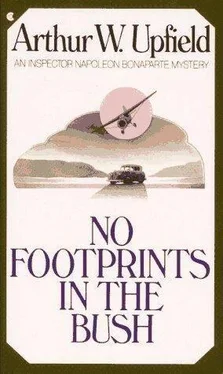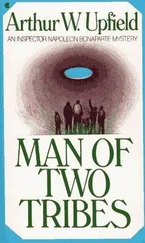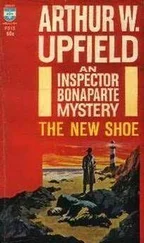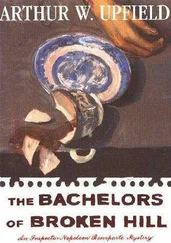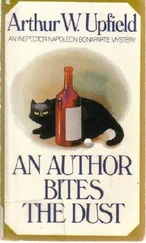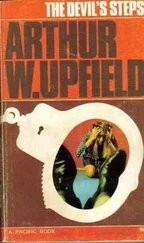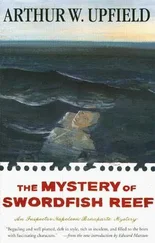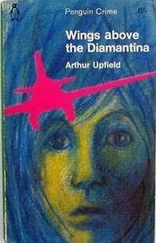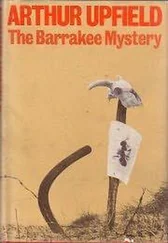Arthur Upfield - No footprints in the bush
Здесь есть возможность читать онлайн «Arthur Upfield - No footprints in the bush» весь текст электронной книги совершенно бесплатно (целиком полную версию без сокращений). В некоторых случаях можно слушать аудио, скачать через торрент в формате fb2 и присутствует краткое содержание. Жанр: Классический детектив, на английском языке. Описание произведения, (предисловие) а так же отзывы посетителей доступны на портале библиотеки ЛибКат.
- Название:No footprints in the bush
- Автор:
- Жанр:
- Год:неизвестен
- ISBN:нет данных
- Рейтинг книги:5 / 5. Голосов: 1
-
Избранное:Добавить в избранное
- Отзывы:
-
Ваша оценка:
- 100
- 1
- 2
- 3
- 4
- 5
No footprints in the bush: краткое содержание, описание и аннотация
Предлагаем к чтению аннотацию, описание, краткое содержание или предисловие (зависит от того, что написал сам автор книги «No footprints in the bush»). Если вы не нашли необходимую информацию о книге — напишите в комментариях, мы постараемся отыскать её.
No footprints in the bush — читать онлайн бесплатно полную книгу (весь текст) целиком
Ниже представлен текст книги, разбитый по страницам. Система сохранения места последней прочитанной страницы, позволяет с удобством читать онлайн бесплатно книгу «No footprints in the bush», без необходимости каждый раз заново искать на чём Вы остановились. Поставьте закладку, и сможете в любой момент перейти на страницу, на которой закончили чтение.
Интервал:
Закладка:
Presently Itcheroo found his mind rebelling against the iron discipline placed over it. He found it increasingly difficult to maintain the picture of the leather case being burned by the fire, and ultimately it faded, flickered and vanished, to be replaced by images of crows and the branches of the scrub trees vibrating in the wind. Now he could hear the crows and the wind in the scrub; and, too, he could smell tobacco smoke.
First he moved his arms so that his eyes might become used to the daylight by gazing at the earth beneath his legs. Then his right hand slid up and over the forearm to take the precious churinga stone and slip it into the dillybag suspended from his neck. That accomplished, he raised his head, to see, squatted opposite him beyond the fire, the stranger half-caste in the very act of blowing cigarette smoke towards him. For a full second of time he looked into the cold eyes of Napoleon Bonaparte, and then his gaze was directed by the gaze of the cold blue eyes to the fire, in which still remained charred portions of the leather case and the charred leaves of several notebooks.
“So! You big feller magic feller, eh?” observed Bony.“Youstealum sergeant’s dillybag from my swag, eh? Yousendum mulga wire to Illprinka feller, and Illprinka feller he run and tell-it Rex McPherson. You fine blackfeller all right.”
Chapter Nine
The Enigma
THE gully eastward of the McPherson homestead was far less steep-sloped than that dammed by the great concrete-faced wall. The floor of the eastward gully was wide and comparatively flat, providing an excellent ground in the shade of the bloodwoods for an aboriginal camp. Through the camp lay the long sheet of almost permanent water created by a low barrier composed of firmly cemented boulders; and on either side of the water were built the humpies of tree-boughs and bags and bark, small humpies sheltering families and large humpies sheltering the unmarried bucks and the widows.
This morning the entire camp exuded an atmosphere of domesticity. Below the dam wall lubras were engaged washing dungaree trousers and the shirts used by bucks, recently employed as stockmen, who now had rejoined the tribe, these garments having to be returned to store. About the large communal fires lubras were baking iron-hard flap-jacks of flour as the nardoo seeds were scarce, and men were fire-hardening spear points or carving spear throwers, or making head and arm bands and dilly-bags. The birds maintained an incessant tumult, to which were added the barking of dogs and the excited yells of a ring of young men surrounding two who were fighting with bare hands with reasonable conformity to the boxing rules as laid down by theMarquess of Queensberry and introduced by the second McPherson through Chief Burning Water.
At the upper end of the sheet of water was situated the chief’s humpy. He was now lying outside it, on the broad of his back, with a small girl on one side of him and his younger wife, and the mother of the child, on the other.
The child, pot-bellied and straight-legged and in the toddling stage, was engaged in constructing, with the contents of a box of matches, what was supposed to represent a fowl-house. The site of the building was on the chief’s naked stomach.
“It’s not high enough yet,” he observed in the Wantella dialect. “Chook-chook will fly out if you’re not quick.”
With the enviable concentration of small children, Burning Water’s youngest child continued to build the walls of the “chook house” until the mother said she thought they were high enough. Across the walls were laid matches to support pieces of leopard-wood bark, representing the white man’s iron roof sheets. Eventually the house was finished, and with a swiftly changing countenance the child regarded her prostrate father with laughter-lit eyes.
“Willi-willino blow down chook house this time,” she taunted, and the man and the woman joined in admiration of the building. “You wait till awilli-willi comes along,” Burning Water said.
“It won’t blow my chook house down this time,” predicted the small girl, and then fell into a pose still and expectant.
Chief Burning Water had to obey certain rules in this game. He was not to sit up. He was not to shake the house down with the muscles of his stomach. He was to lie perfectly flat and try to blow down the house by blowing across his chest. As he took air into his lungs, the child and its mother alternately watched the man’s expanding chest, to be sure that an upheaval of its foundations would not be the cause of the house’s collapse. Pop was likely not to play the game fairly, if given the chance.
Burning Water expelled air in the direction of the house, but it defied the attack, and the child and its mother shrieked with joy. Again Burning Water blew and again failed.
“I’ll do it this time,” he boasted. “You watch.”
For the third time he drew air into his lungs, and then with mighty effort he blew downward along his great chest towards the house on his stomach. Purposely he contracted his stomach muscles and the house fell in ruins.
The toddler and her mother shrieked with glee, the little girl chanting:
“Yaya! You moved your tummy! You moved your tummy!”
“I didn’t,” Burning Water indignantly denied.
“You did! You did! You did!” chanted the victor.
Burning Water pretended to be crestfallen and exhausted with effort, and then the child jumped upon his stomach and danced until he rolled his body and she fell to the ground. All were laughing when the elderly wife working over the “private” fire called that the strange half-caste was approaching the camp.
At once the younger woman ran into the humpy and the child ran to join her. The older woman went on with her work as she was supposed to be past the period of being attractive to any man. Burning Water stood up, dustedhimself by shaking his body much like an animal, and then called for his pipe and tobacco.
The older woman trotted to the humpy to take the pipe and tobacco plug from the youngerwho remained within its shelter. Burning Water saw Bony halt when fifty yards from the camp and sit on his heels in conformity with aboriginal etiquette. The tobacco and pipe were brought to the chief, and he left camp to welcome the visitor.
“Good day!” he said, his black eyes beaming, and on hisface a smile.
The now standing Bony repeated the greeting, adding:
“I’ve come to talk of men and matters, and I suggest we make a little fire up the gully where we can draw maps.”
Burning Water nodded assent, and together they walked from the camp to a bend in the gully where flood-water had scooped a great hole in the right bank. Here they made a fire and, like men down the ages, sat on their heels one either side of the rising blue smoke.
“Did you see the aeroplane last night?” inquired Bony.
“Yes. Its coming alarmed the tribe, for even the children knew that Sergeant Errey and Mit-ji died because of the aeroplane.”
“You kept silent on that point?”
“Yes. But-well, you know how news cannot be hidden.”
“I suppose Itcheroo was the newspaper?”
“You know about Itcheroo?”
“More than a little. The aeroplane pilot dropped a message when he flew over last night. Here it is.”
The small sheet of paper was passed through the fire smoke to Burning Water who read the neat writing on it, and afterwards stared at his visitor with eyes empty of expression.
Bony stood up, waited for the chief to stand. He then gave the sign seen by Sturt when that explorer met aborigines beyond the north-west corner of New South Wales. Solemnly he said:
“We stand on the square of squares, and within the circle where we face the moon rising in the east. Who wrote that message?”
Читать дальшеИнтервал:
Закладка:
Похожие книги на «No footprints in the bush»
Представляем Вашему вниманию похожие книги на «No footprints in the bush» списком для выбора. Мы отобрали схожую по названию и смыслу литературу в надежде предоставить читателям больше вариантов отыскать новые, интересные, ещё непрочитанные произведения.
Обсуждение, отзывы о книге «No footprints in the bush» и просто собственные мнения читателей. Оставьте ваши комментарии, напишите, что Вы думаете о произведении, его смысле или главных героях. Укажите что конкретно понравилось, а что нет, и почему Вы так считаете.
